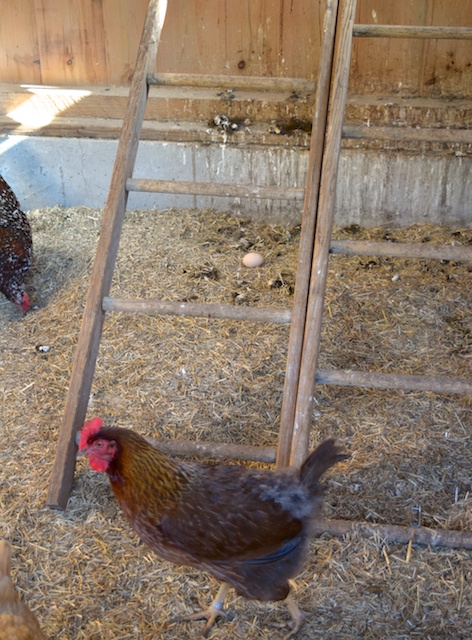The nesting boxes are clean and inviting. The hens are trained to roost and not sleep where they lay. And yet, even so, once in awhile I see this.
An egg on the floor. Often, it’s under the roost. I know it wasn’t laid when the hens were sleeping. First of all, hens don’t lay eggs at night. Secondly, there’s no way an egg could survive intact from a drop from the top bar of the roost.
This is something that you want to keep to a minimum. This photo shows three days of manure accumulation. An egg sitting in those feces is more susceptible to picking up bacteria than one laid in a dry and clean nest. It’s also liable to be stepped on and broken, and then it will be eaten by the hens, and then they’ll learn to peck at and eat eggs. Egg laying on the floor of the coop (or sometimes, you’ll see an egg outside in the dirt) is something that you want to prevent. To do that, it helps to know why this is happening. Like so much with hen keeping, that comes down to experience, knowing your flock, and guesswork.
The first thing to ask yourself is: are the nesting boxes still inviting? As the seasons change and the light comes into the coop at a different angle, all of a sudden they might be too bright. Or, is there a predator keeping the hens out of the nesting boxes? I’ve heard of both snakes and opossums moving in. None of those possibilities are the case in my barn. Then, take awhile to observe your birds. Is someone sick? Has the flock dynamic changed so that a hen isn’t feeling welcome in the boxes? All of my hens are fine. Take a look at the egg. Is there something off about it? When a hen lays a thin-shelled or soft egg, it can be difficult for her to push it out. She’s uncomfortable, and I’ve seen hens walk around until finally able to lay. The eggs that I’ve recently found on the floor are solid, but I’ve noticed that these eggs tend to have a dull texture, as if they have no bloom (which is a protein coating that give the egg its shine and protects it from germs.). The bloom makes the egg very smooth and tough and eases laying. Without that, perhaps the hen had a difficult time laying and was straining too hard to stay put in the nesting box.
Although thin-shelled eggs are often due to diet or old age (or both) that’s not the case with my flock. In fact, the eleven hens in the Big Barn have been high producers of quality eggs. I’ve been collecting anywhere from seven to ten eggs daily from them. Because it takes more than twenty-four hours to lay an egg (upwards of twenty-six or more), over the course of the week, the hens lay later and later in the day, until they are laying an hour or so before dusk. Usually what happens is when the cycle gets too late in the evening, then the hen skips that day, and then lays first thing in the morning. Sometimes though, she gets on the roost and realizes that she can’t wait, jumps down, lays her egg, and hops back up and goes to sleep. Sometimes she makes it through the night and as soon as she wakes up, she lays her egg right when she hits the ground. This is my best guess for why I’ve found an egg now and then on the floor of the coop. But I could be wrong. I found the remnants of a broken soft-shelled egg in the nesting box this morning. I’ll be keeping an eye on things.


I’ll be curious about this. I have one chicken who has been laying soft eggs directly under the roost about every other egg or so (and sometimes for a couple eggs in a row). They are never there at night and are there first thing in the morning (6:30 or so). Always the same chicken. Other chickens are fine (so I don’t think diet). She’s also always been my flightiest bird, so I’ve wondered if she’s just not sitting and thinking about the process long enough. She’s otherwise healthy.
This is a long-winded way of saying I’m interested to hear what you say as you keep an eye on things.
Some chickens can handle poor diets better than others. Doing necropsies on hens, I’ve seen many with compromised intestinal tracts. So, it’s always best to have an optimum diet if possible. Flightiness can affect shell formation. They really do need to settle down for a half hour before laying. That’s one reason why hens that are stressed in industrial egg facilities lay poorer quality eggs – they’re too anxious to settle properly.
My Black Copper Marans (1 year old) always lays a beautiful dark brown egg but the shell is always rough in texture ….. like sandpaper. Is this diet related? Is this what you mean by “no bloom”?
In my anecdotal evidence I can’t relate that rough texture to diet, rather it appears to be a laying glitch when they don’t put on the bloom. But, since the bloom is mostly protein who knows?
I’ve had a few eggs laid on the floor lately. But two weeks ago I started transitioning my big hens from layer to grower crumbles. I’m also in the process of moving 6 week old chicks out of the garage and into their run. The run is divided to keep them separated but I will eventually integrate them into one flock and that will happen before the babies are ready for layer.
Of my two adults, one eats plenty of oyster shell and her eggs are fine. But my Andalusian doesn’t care for oyster shell and she is the one struggling. So I asked the catering manager at my office if he would save me egg shells from breakfast and he agreed. My Andalusian loves crushed egg shell so I’m eager to get those home tonight to bake up and see if that doesn’t resolve my issue.
You’re lucky that she likes the eggshells, in my experience, the chickens aren’t too fond of them. As always, with chickens, there are exceptions!
When I notice my hens are leaving the egg shells mixed in with other food, I just crush the shells and throw them in the cast iron skillet after I cook bacon. They seem to like the crushed eggs shell just fine. I put them in other “flavors” they seem to like. The very few times something happened to an egg, like it was cracked or too poopy, I just scramble the egg and give it the them. Chickens love scrambled eggs. Oh, this is one time I put egg shells into the scrambled eggs for them.
If I put bacon-smelling eggs in the chicken run, my poor dogs would go bonkers :)
Thanks Terry. That is exactly the question I was going to come to you with today. I think my girl is in the wait so late in the day that she has to do it first thing in the morning category, but I will be watching as well. My other question is what do you do with those eggs? I have been scrambling mine and feeding them back to the girls. Is that a good idea?
If the egg is very dirty, I toss it, or cook and feed to the dogs. If it is laid in the run and has been sitting in the hot sun, I throw it out.
i have had a lot of problems latley with my 2 yr old gold star ruby laying soft shell eggs, I found her twicein the nest box after dark distress. she has laid some of these bad eggs while roosting because i find them in the morning broken under roost, it as been a very stressful time for me with this. i love my Ruby an dI am hoping she isnt sick, I have had a bad run of luck with my girls, I have lost three this past year to I dont know what onky one showed signs of being sick. Im feeding them thier eggshells back and they always have oyster shell, even mixing it nto the feed/ I have started disolving a calcium tab in the water, some days it helps but something is definitly wrong.I have limited treats to just greens and an occasional half ear of corn. So much to learn about chickens, I never knew it ould be this hard, my problem is i am very attatched to them they are my baby girls, love them to death.
Judy, chicken keeping IS hard, and losses are part of the experience. You have high producing hens. Sadly, they often develop laying issues, or simply give out, by the end of their second year. Now that you’ve tweaked their diet, you might see an improvement. If not, rest assured that you’re giving them a very good life and there’s nothing more to do, other than to enjoy them while you have them. Chickens live in the moment; enjoy them on their own terms.
Ruby sounds like my 2 yr old Barred Rock, Scarlett. She was a very high producing hen last year and was laying 26-28 eggs per month. Then she started laying soft-shelled eggs about half of the time. They’ve all been soft since the New Year and I am just thankful that she hasn’t laid anything in the past two weeks. Her comb is bright red and, most of the time, she is very perky and eager to eat her layer crumbles. I know that something is seriously wrong inside of her but I’m just happy to see her bossing her flock around for as long as she can.
Yes I guess I have to accept this as what it is. I know on a working farm, they would be in the soup pot. But of course cant do that. They are happy and thats the most important. Got seven babies in the house, have to see what happens. Thanks for all the help!
On occasion, I’ve had girls lay in the darkness of early morning. The nest boxes are 2ft off the ground too. I didn’t think chickens had good night vision to do that but they fly up to the nest just fine.
I’m having the same issue with my small three hen flock, a few weeks ago the lowest status hen started laying right outside one of the two egg boxes. ( reminds me of when a cat disapproves of the litter box& uses this technique to let you know). The box is clean, in a quiet spot, the other two have their favorite egg box &rarely lay the other box. I will be reading your posts to see what the solution may be.